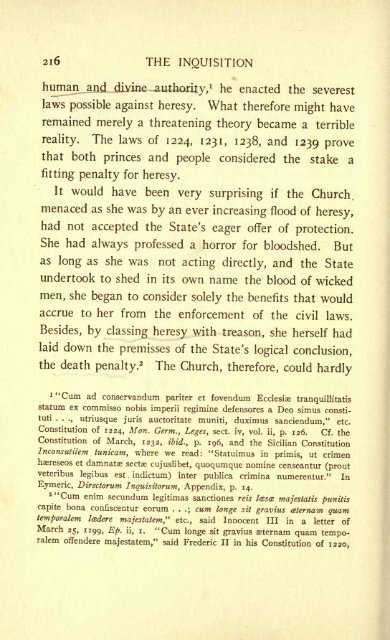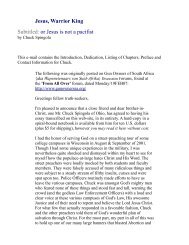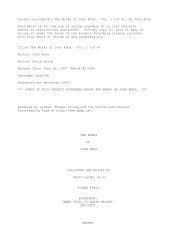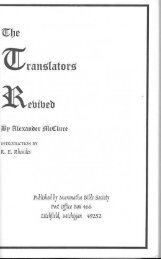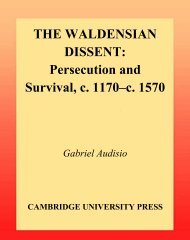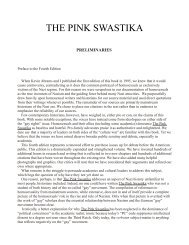Untitled - Shattering Denial
Untitled - Shattering Denial
Untitled - Shattering Denial
Create successful ePaper yourself
Turn your PDF publications into a flip-book with our unique Google optimized e-Paper software.
216 THE INQUISITION<br />
human and. divide authority, 1<br />
he enacted the severest<br />
laws possible against heresy. What therefore might have<br />
remained merely a threatening theory became a terrible<br />
reality. The laws of 1224, 1231, 1238, and 1239 prove<br />
that both princes and people considered the stake a<br />
fitting penalty for heresy.<br />
It would have been very surprising if the Church,<br />
menaced as she was by an ever increasing flood of heresy,<br />
had not accepted the State s eager offer of protection.<br />
She had always professed a horror for bloodshed. But<br />
as long as she was not acting directly, and the State<br />
undertook to shed in its own name the blood of wicked<br />
men, she began to consider solely the benefits that would<br />
accrue to her from the enforcement of the civil laws.<br />
Besides, by classing heresy with treason, she herself had<br />
laid down the premisses of the State s logical conclusion,<br />
the death penalty. 2 The Church, therefore, could hardly<br />
^ Cum ad conservandum pariter et fovendum Ecclesiaa tranquillitatis<br />
statum ex commisso nobis imperil regimine defensores a Deo simus consti-<br />
tuti . .<br />
., utriusque juris auctoritate muniti, duximus sanciendum," etc.<br />
Constitution of 1224, Mon. Germ., Leges, sect, iv, vol. ii, p. 126. Cf. the<br />
Constitution of March, 1232, ibid., p. 196, and the Sicilian Constitution<br />
Inconsutilem tunicam, where we read: "Statuimus in primis, ut crimen<br />
hasreseos et damnatae sectas cujuslibet, quoqumque nomine censeantur (prout<br />
veteribus legibus est . indictum) inter publica crimina numerentur." In<br />
Eymeric, Directorum Inquisitorum, Appendix, p. 14.<br />
2 "Cum enim secundum legitimas sanctiones reis lessee majestatis punitis<br />
capite bona confiscentur eorum . . .; cum longe sit gramus aternam quam<br />
temporalem ladere majestatem," etc., said Innocent III in a letter of<br />
March 25, 1199, Ep. ii, i. "Cum longe sit gravius aeternam quam tempo<br />
ralem offendere majestatem," said Frederic II in his Constitution of 1220,


